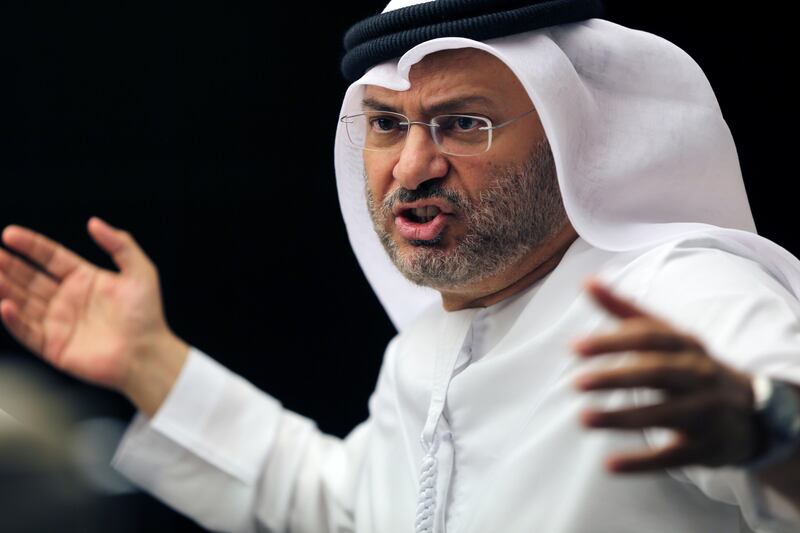There is still no end in sight to the dispute between Qatar and the Saudi-led bloc of four Arab countries after a week of shuttle diplomacy between the sides by the top US diplomat, UAE and US officials said.
"We are headed for a long estrangement ... we are very far from a political solution involving a change in Qatar's course, and in light of that nothing will change and we have to look for a different format of relations," UAE minister of state for foreign affairs Anwar Gargash said on Friday on Twitter.
متجهون إلى قطيعة ستطول،هو ملخص الشواهد التي أمامنا، وكما تصرخ قطر بالقرار السيادي فالدول الأربع المقاطعة للإرهاب تُمارس إجراءتها السيادية.
— د. أنور قرقاش (@AnwarGargash) July 13, 2017
للدول الأربع المقاطعة كل الحق في حماية نفسها وإغلاق حدودها وحماية إستقرارها،وإجراءاتها في هذا السياق مستمرة وستتعزز،حقها أن تعزل التآمر عنها
— د. أنور قرقاش (@AnwarGargash) July 13, 2017
الحقيقة أننا بعيدين كل البعد عن الحل السياسي المرتبط بتغيير قطر لتوجهها، وفِي ظل ذلك لن يتغير شيء وعلينا البحث عن نسق مختلف من العلاقات.
— د. أنور قرقاش (@AnwarGargash) July 13, 2017
أرى أزمة قطر،وبعد الصخب المصاحب،تتجه إلى مرحلة "النار الهادئة" ونحن ندرك يوما بعد يوم أن الجار المربك والمرتبك لا يرى الحاجة ليراجع مساره.
— د. أنور قرقاش (@AnwarGargash) July 13, 2017
نحن أمام خيارات سيادية سيمارسها كل الأطراف حسب مصالحه الوطنية وثقته في من حوله وقراءته لجواره،ولعله الأصوب في ظل إختلاف النهج وإنعدام الثقة.
— د. أنور قرقاش (@AnwarGargash) July 13, 2017
وبرغم أننا قد نخسر الجار المربك والمرتبك، بنسيجه الإجتماعي الواحد، نكسب الوضوح والشفافية، وهو عالم رحب واسع سنتحرك فيه مجموعة متجانسة صادقة.
— د. أنور قرقاش (@AnwarGargash) July 13, 2017
The statement suggested no breakthrough in the situation after US secretary of state Rex Tillerson left the Gulf on Thursday following a three-day tour of Gulf Arab countries aimed at easing the worst dispute in years among America's Arab allies.
Rex Tillerson issued no official statement as he headed back to Washington after a second meeting with Qatar’s Emir Sheikh Tamim that followed talks with the Saudi Arabia's king and crown prince and foreign ministers from Saudi Arabia, UAE, Bahrain and Egypt on Wednesday. In between there were meetings in Kuwait, the principal mediator in the dispute.
However, the US secretary of state echoed Mr Gargash's view while speaking to reporters en route to Washington, saying that “the final and ultimate resolution may take quite a while”.
But he was also cautiously optimistic that there are at least some areas under consideration where the two sides could find compromise, and that there is a “changed sense of willingness to at least be open to talking to one another and that was not the case before I came”.
The state department spokeswoman said earlier that the US hopes the next step in the mediation initiative will be face-to-face talks between Qatar and the boycotting countries..
US officials have also suggested a second round of talks could begin in the coming weeks, which would also involve Britain. But officials from the four Arab countries gave no indication that they are yet willing to engage directly or that they see any signs from Doha of any willingness to compromise.
Mr Tillerson and his Qatari counterpart signed a bilateral agreement on enhanced US oversight of financial counterterrorism in the emirate, in a bid to indirectly address what the quartet had said was their primary grievance.
While details of the memorandum of understanding may not be made public,state department spokeswoman, Heather Nauert, said, “ It is something where there will be regular, high-level consultations between Qatar and the United States. It’s sort of a form of a counterterrorism dialogue. There will be benchmarks in place, there will be ways that we check in with them and that they check in with us.”
The four countries supported the agreement but said it was a result of pressure from them, rather than the US or anyone else, and UAE officials have expressed their doubts about Qatar sticking to its commitments.
Another issue that could provide a confidence-building measure is an editorial restructuring of Al Jazeera Arabic, rather than a full shutdown of the network, as the quartet originally demanded, though Qatari officials have said nothing about whether they will discuss the idea.
“If we can begin to have some success beginning to take some of these issues off the table because we now have a way to move forward then I’m hoping that will start the process of returning, normalizing relations,” Mr Tillerson said. He added that some of the demands “can be addressed up front fairly quickly, some of them are going to be, I think, more complex.”
Saudi Arabia, the UAE, Bahrain and Egypt cut diplomatic and transport ties with Qatar on June 5, accusing it of supporting terrorism and regional arch-foe Iran - all denied by Doha.
* With Reuters





